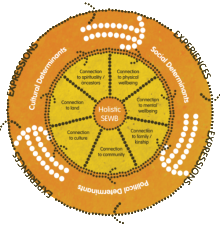 “Indigenous people have a holistic view of health and wellbeing that incorporates the physical, spiritual, mental, emotional, scial and environmental. It does not just focus on the individual, but also on the health and wellbeing of the community.”
“Indigenous people have a holistic view of health and wellbeing that incorporates the physical, spiritual, mental, emotional, scial and environmental. It does not just focus on the individual, but also on the health and wellbeing of the community.”
Indigenous Heath and Wellbeing
To appreciate the many ways that society can facilitate the healing of Indigenous people, we must understand the Indigenous view of health and wellbeing. It is different to that of western culture.
Indigenous people have a holistic view of health and wellbeing that incorporates the physical, spiritual, mental, emotional, social and environmental. It does not just focus on the individual, but also on the health and wellbeing of the community.
This view, which has been in existence for tens of thousands of years, is far richer than the western concept of mental health, which comes from an illness or clinical perspective.




